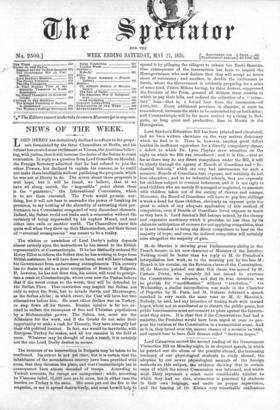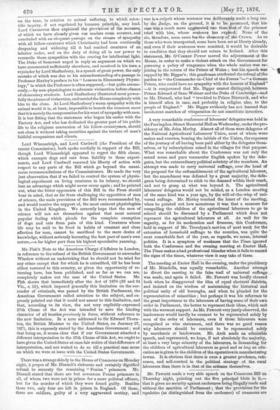Lord Carnarvon moved the second reading of the Government Vivisection
Bill on Monday night, in an eloquent speech, in which he pointed out the abuse of the practice abroad, the increasing tendency of our physiological students to study abroad, the adoption by our newer physiological manuals of the foreign methods on this subject, the evidence showing that in certain cases of which the recent Commission was informed, and which most likely represent a much more considerable number to which they had no clue, vivisection is practised by students in their own lodgings, and under no proper supervision, and the bearing of Dr. Klein's very remarkable confessions
on the tone, in relation to animal suffering, to which scien- tific inquiry, if not regulated by humane principle, may lead. Lord Carnarvon then explained the provisions of the memntre, of which we have already given our readers some account, and concluded with an eloquent passage on the stream of sympathy with all fellow-creatures which Christianity had been continual)7 deepening and widening till it had reached creatures of an inferior order, and on the duty of doing all in our power to reconcile those sympathies with the craving for intellectual light. The Duke of Somerset urged in reply an argument on which we have commented sufficiently elsewhere, and received in his turn a rejoinder by Lord Shaftesbury, in a speech of great power, the only mistake of which was due to his misunderstanding of a passage in Professor Huxley's preface to his "Lessons in Elementary Physio- logy," in which the Professor is often supposed,—but quite errone- ously,—by non-physiologists to advocate vivisection before classes of elementary students. Lord Shaftesbury illustrated most power- fully the abuses of vivisection, and carried the House completely with him to the close. At Lord Shaftesbury's warm sympathy with the animal world it is, at least, impossible to launch the common sneer that it is merely the compensation for his want of sympatkiy with men. It is but fitting that the statesman who began his career with the Factory Act, and who has dedicated the greater part of his public life to the religious conversion of his fellow-countrymen, should not close it without taking securities against the torture of man's faithful companions and clients.































 Previous page
Previous page